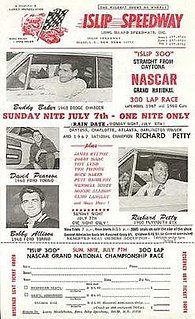Related Research Articles
The 1971 NASCAR Winston Cup Series season began on Sunday February 14 and ended on Sunday November 20. Richard Petty was the champion for this Winston Cup season. After 20 years of being named the NASCAR Grand National Series, R. J. Reynolds first became the primary sponsor in a decade where the growing anti-tobacco movement banned its advertisement on television and motorsports was the ideal place to place their advertisements. Through NASCAR, Winston merchandise was unveiled to live viewers of the races. This kind of merchandise would also be given out at stores that sold cigarettes in subsequent years. Race car drivers were encouraged to smoke cigarettes until the mid-2000s brought in strict drug testing policies in addition to a smoking cessation program by Nicorette, a GlaxoSmithKline brand.
The 1971 Islip 250 was a NASCAR Winston Cup Series race that occurred on July 15, 1971, at Islip Speedway in Islip, New York.

The 1968 Islip 300 was a NASCAR Grand National Series event that was held on July 7, 1968, at Islip Speedway in Islip, New York.

The 1968 Rebel 400 was a NASCAR Grand National Series event that was held on May 11, 1968, at Darlington Raceway in Darlington, South Carolina.

The 1968 Northern 300 was a NASCAR Grand National Series event that was held on July 14, 1968, at Trenton Speedway in Trenton, New Jersey.

The 1971 Delaware 500 was a NASCAR Winston Cup Series race that took place on October 17, 1971, at Dover Downs International Speedway.
The 1968 Hickory 250 was a NASCAR Grand National Series event that was held on April 7, 1968, at Hickory Speedway in Hickory, North Carolina.
The 1968 Beltsville 300 was a NASCAR Grand National Series event that was held on May 17, 1968, at Beltsville Speedway in Beltsville, Maryland.
The 1968 Tidewater 250 was a NASCAR Grand National Series event that was held on May 18, 1968, at Langley Field Speedway in Hampton, Virginia.

The 1968 Dixie 250 was a NASCAR Grand National Series event that was held on May 3, 1968, at Augusta Speedway in Augusta, Georgia.
The 1963 Sandlapper 200 was the site of Richard Petty's 25th NASCAR Grand National win for Petty Enterprises.
The 1963 NASCAR Grand National Series was an American stock car racing competition. It was the fourteenth running of what is now called the Monster Energy NASCAR Cup Series.
The 1970 Greenville 200 was a NASCAR Grand National Series event that was held on June 27, 1970, at Greenville-Pickens Speedway in Greenville, South Carolina.
The 1971 Sandlapper 200 was a NASCAR Winston Cup Series racing event that took place on August 27, 1971, at Columbia Speedway in Columbia, South Carolina.

The 1971 Dixie 500 was a NASCAR Winston Cup Series racing event that took place on August 1, 1971, at Atlanta International Raceway in Hampton, Georgia.
The 1969 Sandlapper 200 was a NASCAR Grand National Series event that was held on September 18, 1969, at Columbia Speedway in Columbia, South Carolina.

The 1971 National 500 was a NASCAR Winston Cup Series racing event that took place on October 10, 1971, at Charlotte Motor Speedway in Concord, North Carolina. Most of the vehicles used in the race had a rating of 427 cubic inches.

The 1977 Wilkes 400 was a NASCAR Winston Cup Series racing event that was held on October 2, 1977, at North Wilkesboro Speedway in North Wilkesboro, North Carolina.

The 1968 American 500 was a NASCAR Grand National Series event that was held on October 27, 1968, at North Carolina Motor Speedway in Rockingham, North Carolina.

The 1970 Rebel 400 was a NASCAR Grand National Series event that was held on May 9, 1970, at Darlington Raceway in Darlington, South Carolina. The race is known for a crash involving Richard Petty that inspired NASCAR to implement the window net; a mandatory safety feature in today's NASCAR vehicles.
References
- ↑ Weather information for the 1968 Columbia 200 at The Old Farmers' Almanac
- 1 2 3 4 5 6 7 8 9 10 11 12 1968 Columbia 200 information at Racing Reference
- ↑ Columbia Speedway page of Racing-Reference website , retrieved 8 May 2007.
- ↑ Fielden, Greg, "NASCAR Cleans Up", Speedway Illustrated, September 2004.
- 1 2 1968 Columbia 200 Archived 2011-09-28 at the Wayback Machine information at Everything Stock Car
- ↑ NASCAR Race Results for the 1968 Columbia 200 at Fantasy Racing Cheat Sheet
- ↑ 1968 Columbia 200 crew chiefs information at Racing Reference
| Preceded by 1968 Greenville 200 | NASCAR Grand National Series Season 1968 | Succeeded by 1968 Gwyn Staley 400 |